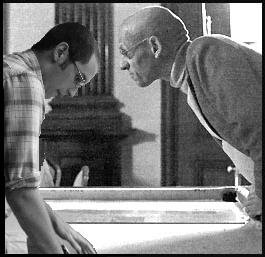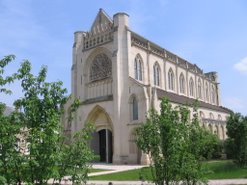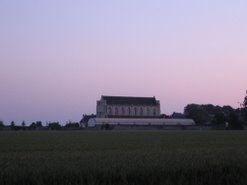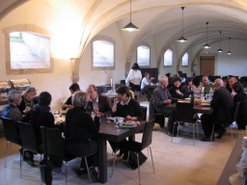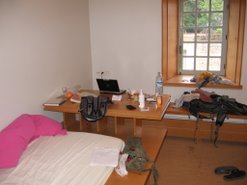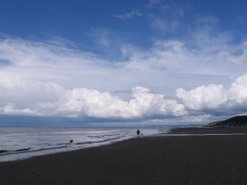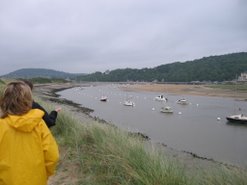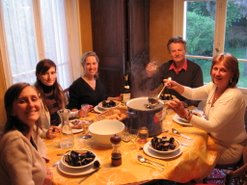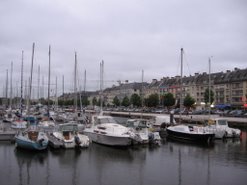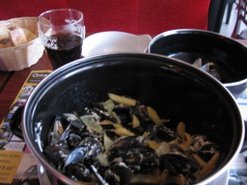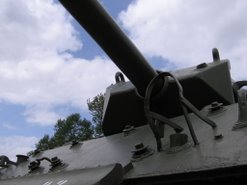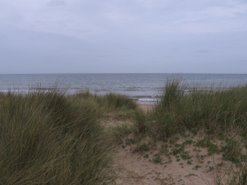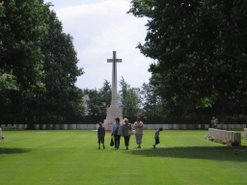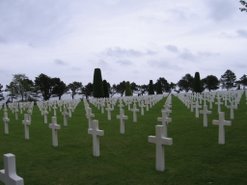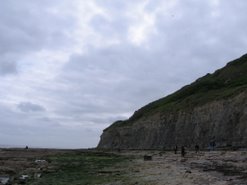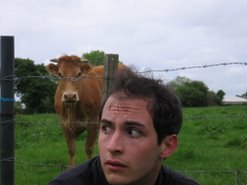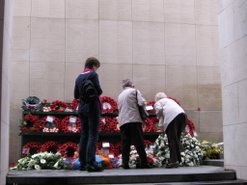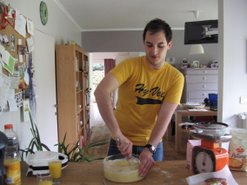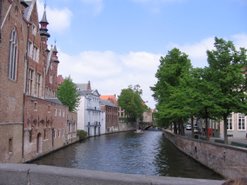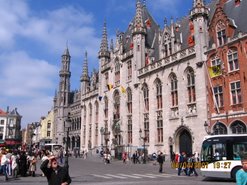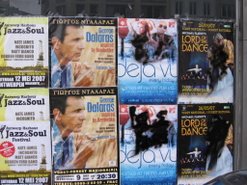Trench Warfare with Waffles.
May 2 - May 14
In the museum in Ieper Belgium you can read a newspaper from 1915. A headline bemoans the loss of two days of carnival due to inclement weather. This was perhaps newsworthy for the locals, but for a modern observer it seems blissfully out of step with history. For in just a few days after this headline appeared a massive German Army would penetrate the boarder of Belgium in an attempt to invade France and push men and tanks and bombs right up to the walls of Ieper.
Severely outnumbered and outgunned the Belgian Army could do little else than flood their own country in hopes of slowing the German advance. The king of Belgium ordered the dams opened and Belgium was turned into a swampy mess. This did indeed slow the Germans but also pushed them right towards Ieper. Ieper was a once powerful wool-trading city, but in 1915 it was a sleepy agricultural city in southern Flanders.
In the coming days British troops arrived in Ieper and both sides found themselves in a bloody stalemate. They both decided to dig in. So it was for the next 4 years. British trenches faced German trenches in the swampy muck that was Flanders. At some points on the line the trenches were not more than 50 meters apart.
The town of Ieper was destroyed by German artillery who didn’t want British troops using it for winter shelter. Ieper was also the first place both chlorine and mustard gas were used, and well before gas masks were even available as defenses. There were 5 all out battles in these years. But many more young men died of typhoid. Perhaps the most frightening death was being pulled down by your own gear to sink and drown in the mud. The death tolls were in the hundreds of thousands, and most of those who died were my age or younger.
When the war ended Winston Churchill, the then new Minister of War attempted to buy the city of rubble that was Ieper and make it British soil, calling it the most hallowed ground of British history. His intention was to leave it in ruins as a reminder of the momentous events that took place there. This never happened, but even now cemeteries dot the landscapes that are maintained by the British government. Instead of Churchill’s massive memorial the townspeople returned and began to rebuild.
The town was rebuilt to look like the Gothic village it once was, but most of the construction is less than 70 years old. To walk down the streets is to see flower boxes on half timbered houses and splash in puddles gathering in the cobbled streets, perhaps as one would have in the 17th century, never mind the rumble of cars and buses. The town museum is tucked into a new building made to look like a 14th century wool storage house.
Somehow just like the headline from before the war, everything still seems blissfully out of sync with history. I have had similar experiences in other places in Belgium. But perhaps we are getting ahead of ourselves.
The day I left for Belgium I was finishing up an application for future research/ graduate school funding. I usually work up to the last minute, and as usual, on the way out of town I dropped the letter in the mail box before buzzing up to the airport .
Mom and Dad came in to the airport and sat with me near the Icelandic air ticket counter. We small talked about French busses and then hugged and said goodbye. As I passed through security my parents stood and waved me off. But I got caught behind a Philippino family negotiating a stroller through the metal detector and was stuck too far away to talk to my parents but still within sight so we exchanged many more silent waves before I disappeared behind an x-ray machine.
Through some pleasant confusion at the ticket counter I was given a 15 dollar food voucher for restaurants in the terminal. However the Humphery terminal (the smaller of Minneapolis’s two terminals) doesn’t have much in the way of culinary variety. So I ended up spending 15 dollars on bottled water and Sun Chips. I have learned to pack light. But when I boarded the plane I had my backpack and now a huge plastic bag of water and Sun Chips, which the stewardess eyed with apprehension.
I had asked for a window seat, which turned out to be in the exit row. So my only window was a foggy little porthole in the exit door. I was flying on Icelandic air and I wanted to watch the sun rise over the Icelandic plains. But instead I just got a blurry glimpse of what I was told was Iceland. But when I got off the plane in Reykjavík I was able to see across the alien terrain of Iceland, a haunting scape of brown stone and steel sky.
I couldn’t pass into the rest of the airport with any liquids so I had to unceremoniously part with my bag of water and chips. Hopefully the Icelandic customs officers were able to use them.
The Reykjavík airport is small but efficient and everywhere is an internet hot spot. I grabbed a couch in a lounge and shot off some e-mails while looking out a panoramic window. The sky was several hues of grey and the ground was a field strewn with oblong slabs of rock and creeping grass.
Soon I was on my plane to Paris, and landed uneventfully at Charles DeGaule. My father has little sympathy for Charles DeGaule airport. He’s been stuck too many times on the tarmac waiting for a gate in hot plane cabins. We, however, motored right up to a skyway and jumped right out. I think this is a sign of pleasant diplomatic ties between France and Iceland. I passed through passport control, but no one was there to stamp my passport, and no one around even if I wanted to ask for one. So tentatively I passed through customs and into Paris without catching sight of one official.
I was in France, but I had made plans to visit my friend Anneleis in Belgium. She was an AIFS exchange student to Turkey while I was a Rotary exchange student in Istanbul. We lived in the same neighborhood and spent a lot of time together. She is Flemmish from Bruges but now lives and studies in Ghent. This spring seemed like a great opportunity to visit Belgium and catch up with an old friend.
Before I left America I had purchased a bus ticket online. So I made my way from the airport by snaking along the commuter rail lines and the subway until I made it to the eastern fringe of Paris. The area was concrete and bleak but full of people from all over the world. I went to a grocery store and looked at the produce alongside Swahili speaking women, and at the checkout counter I ended up behind a Turkish family. It is interesting that the most cosmopolitan areas of Paris are the farthest from the center. While the West advertises cosmopolitanism it at the same time suppresses it through urban segregation.
Since my time in Turkey I’ve become hyper-aware of the Turkish minority through out Europe. I was in Munich a few years ago and walked thought the highly segregated Turkish neighborhood near the train station. But in these most recent travels I’ve noticed the phenomenon elsewhere too.
The bulk of Turkish immigrants came to Western Europe just after WWII. Many came from poor rural backgrounds hoping to make some money working construction in the rebuilding of Europe. Germany, Belgium, and France all received Turks. After the reconstruction many Turks stayed to make a life for themselves. And now the original population is three generations old.
I was reading about a debate in Germany where nursing homes are filling with aging Turks who speak no German. There is a demand for more nurses who speak Turkish, but there is resistance from some German politicians to accommodate this. Belgium is going through a similar demographic change with its Turkish minority. I spoke with a Belgian student about it. She said that it’s their fault for not learning German, or Flemmish in her country. “They should at least try”. The conversation sat uneasily with me.
When I order food from Turkish waiters in Turkish, or ask for directions to in Turkish while in
Belgium or Germany the Turks are stunned. No one expects the majority to meet the minority on its own terms. But at a more practical level knowing Turkish is wonderfully useful for traveling in Europe. It would be like knowing Spanish while traveling in America. I don’t need to know Dutch, German, and Polish just Turkish and I can get around.
In any case I left Paris not long after the grocery store and took a 4-hour bus to the university city in Flanders, Ghent. The bus dropped me off outside the central train station around 10 o’clock and Anneleis and her boyfriend P.J. were waiting for me. In true Belgian form they were on their bikes and I could see people all around zipping up and down the streets on bicycles. Hugs, kisses and introductions were given all around, and we tried to catch up quickly and concisely, but it had been years.
On our walk to Annelies’s apartment P.J. darted into a late night snack shop and emerged with a paper package. “Try it” he insisted. It was French fries (or rather Belgian fries) covered in gravy. I am usually a vegetarian in America, but usually I let it slide when I travel. This time I let it slide within a matter of hours. It was awfully greasy and awfully good.
Annelies lives in a spacious studio on the third floor of a tall and narrow town house built circa 19th century. Every square inch of the house has been split up into student apartments. I asked if she knew the other students in the building. She looked at me confused, “of course not.” My idea of college living is very different from the Flemmish. I’m used to open doors and friendly gatherings even in off-campus apartments. Annelies has a close group of friends but most of them are from high school. And the vast social networks made at American university just don’t operate here.
The Belgian education system had some other unforeseen consequences on my stay. No matter where you are in Belgium you are never more than 2 hours away from home. And every weekend all the students go home, and they take their laundry with them. When it came time for me to do laundry I asked Anneleis where I could find a Laundromat. She had no idea. Nor did the numerous people I asked on the street. Everyone was a student and everyone has Mom do his or her laundry. People I thought were fellow backpackers because of their massive packs were really just Flemish students toting their laundry from home. Eventually I had to go to a Turkish neighborhood to find a Laundromat.
Annelies rolled me out a sleeping bag and I slept on her carpet. The next morning I followed her to class. Interestingly, class for the day was Turkish Language. The professor was a friendly young man from Istanbul who was very welcoming. He took the opportunity of my presence to have the class practice their Turkish by asking me questions about my trip and having me respond in Turkish. The class was all girls save one Turkish boy who spoke fluently and was just taking the class for the credit.
At one point in the lesson I used the expression insallah. A general expression of hope, that literally means “if god is willing”. A girl spoke up and said she didn’t want to use that word because she was Christian and her god wasn’t Allah. There was an uncomfortable silence as no one really knew what to make of it. The teacher tried to explain first that it’s merely an expression, and then that Allah is really just another name for the same Judeo Christian god. Then more silence. Then he changed the subject to Turkish folk songs, and we finished out the class singing the one Turkish song I know.
The teacher thanked me for visiting and we made tentative plans to go eat Turkish food, but it never worked out. I did bump into him again at the grocery store however and was able to thank him again before leaving Belgium.
After class I met up with P.J. while Annelies went to a class in European history taught in Dutch. PJ and I walked around the cobbled streets and along the canals of Ghent. I would ask him the names of various things we passed in Flemish and I would form basic sentences. Each new sentence I spoke he would get happier, as my Flemish inched along on our long walk.
At once point we passed a few homeless men, and I asked him about poverty in Belgium. He said the unemployment is bad, as high as 8 percent in some parts, and even worse in the French speaking part of the country. He added that the slang for Belgium’s poor is the 4th world. Yet again I was struck by just how good Belgium is at keeping up appearances. Wars and poverty and segregation seem like distant concepts in the omnipresence of flower boxes, houseboats, and the ding of bicycle bells.
I’m not arguing that Belgium should be a living memorial to morbid topics, nor that Belgium is actively engaged in repressing the images of hardship. It is all more subtle than that, and is a process of cultural/social presentation not unique to Belgium. Somehow it was hyper-present to me at that moment when considering the staggering contrasts of what is seen and what is not seen.
We stopped in the city center near a bridge which affords a view of all of Ghent’s church steeples in a row. Pictures were taken and PJ ran off and soon returned with Pufferjis, small deep fried disks covered in chocolate and powdered sugar. “I really like these.” He said. “Who wouldn’t like these?” I said.
PJ is done with school and is now working in a chemical refining factory near the port of Ghent. As our walk wound into the late afternoon he had to jump on his bike and head to work. I continued to walk through the medieval streets. I couldn’t resist and walked to the Turkish neighborhood. It was interesting to watch the signs change. Signs on store fronts were written in Flemish in the center then signs appeared in Flemish and Turkish then eventually just Turkish.
Families milled about. I watched some women buying fabric and heard men playing backgammon and drinking tea across the street. Turkish tea makes a distinctive noise when the sugar spoon hits the sides of Turkish tulip glasses. It sends out a ding that cuts through the air. I am seriously considering proposing research on the Turkish diaspora and Turkish tea drinking rituals seem like another topic for consideration.
Satisfied I wandered back to the center and sat by a canal and stole wireless internet bandwidth while sitting in the sun. The population density of Europe makes it possible to find a hot spot from private wireless routers almost anywhere. I’ve been an amazingly well connected backpacker. More than once when lost I’ve been able to instantly pull up maps and get directions while standing in the middle of a medieval park.
That night I met up with Annelies again and we took the train to Bruges where she grew up and went to high school. Her mom lives just outside in a village called Jabbeke. A short bus ride and a walk and we were home. We were greeted by Hazel their whippet , possibly the nicest, thinnest dog I’ve ever met.
Her mother had prepared a dinner of steaks covered in a mushroom sauce and of course, served with French fries. It was fabulous and I had two servings. At dinner I met her mother’s boyfriend Johan, who for all intents and purposes is her husband. I learned that for a generation many people didn’t get married, but lived together and had children together. Unless you were seriously Catholic many people just didn’t bother. This is changing however and for Annelies’s generation more people are getting married. That very weekend Annelies was going to a bachelorette party for a high school friend who was getting married.
We discussed Flemish/French antagonism. Johan said there is again talk of Flanders separating and becoming independent. He said the argument was Flanders is economically stronger than the French region and people feel they are being unfairly asked (through taxes) to keep the French speaking economy afloat. But he added 15 years ago Flanders had a worse economy and the French wanted to separate. Everyone at the table agreed it’s a lot of political nonsense without much weight. At Ieper I learned that antagonism in WWI between Flemish enlisted men and French-speaking officers fostered the first organized movement for Flemish secession . Eventually the King had to step in and order that orders be given in both French and Flemish.
After dinner Annelies and I took the car into town and met her friends from high school. There was a carnival going on and we couldn’t resist getting some “oil balls”. These are exactly what they sound like, deep fried dough balls. We met about four of her friends who had been planning a trip to Poland later in the summer. I gave them what I knew about Poland and we all exchanged travel stories. They had all been traveling recently, one girl to India another to Latin America.
Eventually it got late and we all left, but we had enjoyed a evening of lively chatter and good company. When we drove back to Jabekka, Annelies asked if I had seen a flash. I said no. She said she thought a police robot caught her speeding and the flash was the robot photographing her license plate. I just shrugged. Back at home I fell into a deep sleep in the family’s guest room.
I was unaware of how jet-lagged and travel-fatigued I really was and the next morning I slept until 1:00 in the afternoon. I emerged blurry-eyed and tousle- headed to a table set for lunch. I had a lovely breakfast of Mussaka. They asked if I wanted something cold before my hot meal. I laughed and said no. In Tanzania I was always asked if I wanted something hot before my cold breakfast. Each culture considers that things hot before cold or cold before hot fosters health. I’m ambivalent.
That night Anneleis was to meet her girlfriends for the bachelorette party. As a lengthy night of drinking was planned she was assigned the task of bringing food. So we made waffles for the party-goers. We ate as many as we made, just to test the batter, I assure you. Anneleis’s sister was performing in a Dutch version of A Midsummer Night’s Dream that evening and her mother was driving into town to get her hair done before the performance. So, we hitched a ride.
I had hoped to tour the museums of Bruges, which house some of the rarest masterpieces of the Dutch primitive school, but after sleeping in and making waffles the museums were already closed. So I made plans to stay another night and see the museums in the morning.
I parted with Anneleis at the train station where she met the rest of the girls in the party and then headed off to walk in the twilight before I had to return to Jabekka to sleep. Bruges is the platonic form of cute. It is remarkably quaint. Take everything I’ve mentioned about Belgium and multiply it by 10. It is also one of Belgium’s biggest tourist attractions. Brussels and Bruges are pretty much the only places people see. In fact my guidebook only had those two cities.
I mingled with Japanese tour groups in little lanes and sat alongside bus-loads of Germans on the banks of the canals. When I passed the central square I ran into the party girls. As is traditional they had dressed up the bride-to-be in a gaudy and outrageous outfit complete with orange tights and polka dot skirt. They were strolling about with a box of wine waiting for the right time to go to the dance club. I snuck up behind them and got a big hearty greeting. I wished the bride a happy wedding and promised I wasn’t following them.
Not long after I jumped on a bus back to Jabekka. I spent the evening watching movies with Johann. We watched “American Treasure”. This is the film where Nicholas Cage finds a Freemason treasure by cracking a code on the back of the Declaration of Independence. I wondered just how exportable this story was. I wondered how many of the references obvious to Americans were unknown in the Belgian context. My feeling was it was exportable and that most of the necessary knowledge has spread through the webs of popular culture.
I rose very early the next morning and was at the museum when it opened. The collection was small and besides the very famous Bosch, Van Eyck, and Memling there was nothing worth mentioning. The famous paintings are all kept in the first 2 galleries. When I first arrived I was almost alone in the museum. But within the hour bus groups were being pushed in. They would only go to the first rooms and elbow for eyeshot of these masterpieces. It was nearly impossible to see the works through the crowd and hard to concentrate over the shouts of tour guides in several languages. I was thankful I had had those few solitary minutes before the rush.
My father had given me a book by a 20th century art collector named Barnes, whose aesthetic sensibility my father admires and agrees with. For the most part I do too. Barnes remarks in his book on a piece by Hans Memling held in the Hospital Museum in Bruges. It is a representation of the life of Saint Ursula. It is, apparently, a jewel-like example of his period with flourishes akin to Persian miniatures. It sounded fantastic. After the first museum I made my way to the Hospital museum in search of the Memling.
A quick turn around the museum turned up nothing except some unremarkable canvasses by anonymous Delft school painters. I did however see an interesting exhibit of a preserved pharmacy. But still no Memling. I asked a guard. He didn’t know where I could find a Memling painting. I asked the ticket seller. Again he had never heard of a Memling painting in the museum. Defeated I retreated. I wondered around the periphery of the city walls and consoled myself in the perfect weather.
Eventually I decided to cut my losses and take the train back to Ghent. Once settled at Annelieses apartment I checked the internet for reference to the Memling painting. Turns out I did see it. It was not a canvas, but a painted box. I had passed by it many times not thinking I was looking for a box. The guards were right. They didn’t have a painting by Memling per se. I half laughed and sighed and went to bed.
The next day flew by. PJ, Annelies and I all got up early to go visit the Ghent castle. It was somewhat ordinary as European castles go, but it had a cool 15th century straight jacket in the dungeon. We ate soup for lunch at a corner café and talked about American politics. An elderly woman across the café watched me like a hawk. I couldn’t tell if she was trying to listen in or trying shut us up. Mid-afternoon Annelies went to class and PJ and I went to another café to play chess. After a few games we went shopping for dinner and returned to his apartment to cook. Anneleis joined us and we had a dinner of spare ribs and stir-fry. It was eclectic but good. We finished out the night watching the film “The Children of Men”. I thoroughly enjoyed it, but realized my Flemish friends couldn’t follow the British dialects and after it was all done I had to explain crucial plot moments without the accent. We all agreed to watch with subtitles next time.
The next morning I bid adieu to Ghent and jumped a train to Antwerp. I had made plans to stay with a friend from high school who I had not heard from or seen for 5 years. Lauren had studied at Luther College and was now an elementary school teacher for international students in Antwerp. She was working until later that evening so I used the afternoon to go to the art museum.
For most of my childhood a painting hung in my room. It was a painting my father did in a painting class in college. It was a copy of Ruben’s crucifixion of Christ. It is a gory tableau of a writhing Christ on the cross being stabbed in the side by a Roman soldier. Its hat any kid would want in his room. The original is in Antwerp. I spent a good long while studying it. It’s larger than life and really a masterpiece of Baroque painting. With a highly cluttered and energized composition it must have been equivalent in its effect to that of a high budget action film now.
The museum was nearly empty. I had yet to meet another traveler outside of Bruges. Belgium in May is not a prime tourist location. But the few people that were in the galleries would spy me intently studying the Rubens and then they would stop and study it too. So many other paintings they would pass over. It was as though they wanted to know why I was so interested. Also I would sit across the room from the painting and people would go all the way around me to avoid breaking my line of sight with the canvas, which is so big no one can block it. These weird moments are examples the strange behaviors exhibited in museums.
There are proper physical movements in museums and proper politenesses in reference to lines of sight. All work together to produce a particular experience. It is sort of experience of being a mind on legs. Everything is created so that you can wander in quiet contemplation, and people behave as such. Isn’t that curious?
Again, I walked to the Turkish area and got some French fries, eventually making my way to Lauren’s. She buzzed me up to her lovely two- bedroom apartment. We caught up as best we could before tiredness overtook us. In the morning when I awoke Lauren was already gone to work. I decided to visit Rubens’ house for the morning.
This was intimately fascinating. The house is nearly a total reconstruction but still an interesting look into life in Antwerp at the height of its power. During the tour they off-handedly mentioned that Rubens loved to garden, and his most prized possession was his potato patch. Potatoes at that point were an exotic plant from the new world and a sign of great prosperity. With the way the Belgians eat fries it seems they’ve never lost that love for potatoes.
After that, as I’m apt to do, I just started walking roughly in the direction of a sculpture museum on the southern edge of the city. As I walked I passed through the Hassidic neighborhood of Antwerp. Men with earlocks and long black coats roamed the streets and rode on bicycles. In this same area I found a wall of movie posters where all cleavage or anything sexual had been blotted out with a black marker.
I kept walking for quite some time but was happily rewarded by the sculpture garden which was spectacular. It was vast and had everything from Rodin to Carl Andre, a great survey or 20th century sculpture. It also boasted a massive inflatable head of George Bush by Tom McCarthy. As I walked in the Garden it started to rain. But this only increased the beauty of the garden. The setting was so tranquil that I found myself in one of those moments when I though, “this is exactly where I want to be right now”.
Delighted and serene I wandered back to Lauren’s apartment. I told her where I had been, and she laughed. Apparently I walked an unthinkably far distance and back again. For dinner we made soup and chicken, and talked about life back in Minnesota and all our mutual friends. I planned to awake again after Lauren had left for work so I thanked her for her hospitality before bed, and drifted effortlessly off to sleep.
It is a rule of traveling that you always forget something. On this trip I forgot my student ID. This card would help me get cheap fares in museums and cheap train tickets. As soon as I left I realized I had forgotten it. So I had my parents mail it to Annaleis. I returned that morning to see if it had arrived yet. It had not. So we spent the day hanging with PJ. We went to a small museum of contemporary art near her apartment. They gave us each free buttons with famous male artists with feminized names. PJ got Annie Warhol, and I got Marcelle Duchampe. I thought they were great and I’ve been wearing mine ever since. We made spaghetti for dinner and then dusted off Anneliese’s nargile that she bought when we lived in Turkey. They invited a friend from high school and we all sat chatting and smoking and eventually we broke out the poker chips. It was lovely but had to end when our guest had to run and catch the last train back to Bruges.
With no student ID yet I decided to visit Brussels while I waited. An old friend from high school had been a teacher in Brussels a few years earlier and he got me in touch with his colleagues who offered to put me up. So again I boarded a morning train and killed time sight-seeing while my hosts worked. That morning was very wet. I just started walking in hopes of finding the center and the famed Manneken Pis, a fountain in the shape of a pissing boy. It is an irreverent symbol of Brussels and a must-see for any visitor. But somehow in the wind and rain and narrow streets, I got very, very lost. When I eventually figured out where I was I was at the walls of the fine arts museum. But when I tried to find the front door I got lost again. Eventually after much wind and rain I found the door. The museum was undergoing major construction and only a few galleries were open. I was hoping to see Bruegel’s Ffall of Icarus” but because of the construction I had to enjoy a lesser Bruegel canvas of a crowd fighting over wine from one large cask.
When I emerged from the museum the weather was marginally better and I made another stab at finding the Manneken Pis.. With not too much effort I found it as if I couldn’t miss it. After a morning of being lost I was inexplicably found.
With still more time to kill I wandered to the site of the European Parliament. Brussels has always been the physical center of the EU development. A large portion of the city is dedicated to the bureaucracy of the EU and one is often in the company of politicians and diplomats when walking in the streets.
I was too late to tour the parliament building, but I must say I was astonished by its exterior. It was huge and inspired a feeling of the gravity to the rule of law. It was a contemporary design of mostly glass with massing curved arches and a tall central tower. It looked exactly as it should, regal and modern. I really liked it. I picked up a copy of the bill of rights for the EU and took a lot of pictures. That building is impressive enough to make me want to work there someday. Never mind that I am not an EU citizen.
I made contact with my hostess. Norah is from Virginia and is still teaching kindergarten in Brussels. She lives near her school in the south of the city in a region called Boifort. We arranged to meet at a bar near there. Once there I met her boyfriend Neil, a remarkably pleasant Kiwi who also teaches kindergarten and their colleague Kevin from Oregon who teaches senior high in the same school. We spent the evening pleasantly chatting about politics and life as an international teacher.
It is an awfully cushy and somewhat seductive life. They have a good salary, all the insurance you could want, paid vacations, and work only half the year. For those who get into it, it’s hard to leave, and this group had created quite a comforatable life for themselves.
The down side was it was still work. They didn’t get out into the city as much as they would like. They would work all day and not have the energy to go to sightseeing or take in a concert, and in a lot of ways their community is made up exclusively of other teachers at the school. Regardless, it seems like a good job….if I ever decide to start working.
After our long chat we went and rented a movie and returned to Norah’s apartment only a short walk away. But, we all fell asleep within minutes of the opening credits.
The next day had weather like the last, and my sense of direction was as bad as the previous morning. I wanted to tour the Art Nouveau architecture of the city, but ended up looking at formalist concrete buildings at every turn. I was armed with a map and a brochure for a walking tour, but it didn’t matter. Eventually I did make it to the home and studio of the Art Nouveau architect Horta. Inside was a beautifully ornate home in which attention was paid to every detail. I particularly enjoyed the slug shaped cupboard handles. But the home was small and I struggled to fill 20 minutes in the rooms. I asked the ticket man if there was any more to see. “Of course not” he said.
From there I jumped on the subway and rode out to the northern edge of the city and to the site of the 1958 worlds fair. For the most part what remains is a lot of empty park land surrounded by big apartment complexes , but in the middle stands one of the weirdest architectural objects ever. It’s called the Atomium and is a 20-story high scale model of an Iron atom that you can go inside. I don’t think it was normal even in 1958. It is some how more fiction than science. Yet the top sub-atomic particle at the top of the structure affords a spectacular view of the city.
I traveled to the top observation deck in an elevator that goes up a massive representation of a valence bond. When I reached the top the sun broke out from behind clouds and I was treated to one of the nicest panoramas possible. Not too far off was an amusement park with an area with miniature representations of famous European land marks. I took a lot of pictures of “Europe” from my perch in the Atomium. How many people can say they have the Eiffel Tower and the Coliseum m in the same picture?
I stayed up there for some time. So long I was actually in the last elevator group to return to earth. But before we could go, security came to us and said the elevator broke. They then led us out onto the maintenance stairs and through the massive infrastructure that tourists don’t normally see. In this group were a 4 or 5 little kids who counted each of the steps in French, all 800 of them. It took a while to walk down but now I can tell my grandchildren I saw the guts of the Atomium.
I met Norah and Neil for dinner soon after. We chose just a normal corner restaurant. Which turned out to be less than desirable. The wait staff seemed to be totally unaware there was a full restaurant and people were constantly calling for their attention. Neil ordered a pricey lamb dish, but it was a portion barely big enough to put on a cracker. Norah got lasagna but it had bits of ham in it. I ordered spare ribs, which to their dismay were really good. Halfway through the meal a roaming Mariachi band entered the restaurant and started playing La Cucaracha right next to our table. Our conversation was drowned out completely, and we all stared at each other in suspended animation not really sure what part of the world we were in anymore. We started laughing, and when the Mariachi band came to out table with their hat out, Neil fumbled in his pockets for nearly two minutes looking for change but could only produce a euro five cent piece I lost it even more.
Norah apologized for the dining experience. I said I loved every minute of it. After dinner we took the bus to the apartment of a friend and colleague of theirs and settled in to watch Eurovison. Eurovision is a yearly competition where nations in Europe put forward pop music acts to compete for the best pop song of the year. It’s been going on for decades and as the European Union expands this pop spectacle only gets more spectacular. It’s an all night affair acts start in the early evening and the results don’t come in for the winner until after midnight. I have never been so engrossed in such a kitsch affair. Ok that’s a lie. I particularly liked the Ukrainian entry that was cross dressing elderly men singing to a techno beat and doing a choreographed dance that was nothing more then closing and opening their arms like alligator jaws.
Unfortunately, they lost to Serbia. The host of this Eurovision party bemoaned the fact that because of the EU expansion eastern European countries have a better chance of winning since they now have more judges. She wanted England to win. Tired and full of catchy songs in our head we rode the bus back home and quickly fell asleep.
The next morning I left early again. Thanking my hosts over breakfast. I walked through Saturday market in their neighborhood and couldn’t resist getting a pastry from a street vendor. I then headed to the central station and grabbed a train to Ieper.
I spent the afternoon in Ieper walking the streets and visiting the cemeteries. Meanwhile Annelies was at the actual wedding of her friend. We had arranged for me to come back to Ghent again that night after the wedding, grab my student card and leave for France the next day.
I grabbed a late train and arrived at her apartment where she gave me a note explaining the post had my letter and I had to retrieve it at the nearest office. So I planned to stay in Ghent one more day.
The next day I went to the post office and was informed that the mail could not move because the mail handlers were on strike and that I should come back tomorrow. So I planned to stay in Ghent one more day.
The next day I returned to the post office to be informed the strikes was continuing and that it would likely continue until Thursday. But that Thursday and Friday were scheduled holidays and there would be no mail until the Monday. But because of the strike nothing has been sorted so the soonest I could get my letter was Tuesday or Wednesday of the following week. I did not plan to stay in Ghent another week.
So I made arrangements to take the bus to France and made plans for Annelies to pick up the letter and mail it to me in France. We spent our last day eating Turkish kebab and watching movies.
The next morning very early I walked to the train station and jumped on the same bus that had dropped me in Belgium almost 2 weeks earlier. Belgium had been good to me, and fostered a lot of thoughts about history’s presence in the present. But in 6 hours I would be in Normandy, specifically Caen where the unpublished lectures of Foucault are archived.
Travel blog of Alex as he combs Eurasia in search of trouble and the lost lectures of Foucault.
Thursday, May 31, 2007
Introduction
Michele Foucault died the month I was born. I would believe in reincarnation but I was already 24 days old when the doctors declared him dead of a brain hemorrhage in Paris. In reality it was AIDS that killed him, but I have often thought there is a certain morbid poetry in saying a philosopher died from a bleeding brain.
Perhaps I’m better off not being a post-modern bodhisattva of Michele Foucault. Throughout his life he often remarked he didn’t know what all the fuss was about. He didn’t think his own philosophy was as significant, as the lengthy list of secondary texts it spawned would suggest. He once remarked that not even he likes his work. After his death a note was found on the writing desk of his apartment requesting that none of his work be published posthumously and several manuscripts should be destroyed.
As a philosopher he was not a systematic thinker. His early works contradict his later works, and individual texts even refute themselves. He wasn’t interested in the big questions like free will or the existence of God. He didn’t make any contributions to the contemporary philosophies of Phenomenology or Structuralism, and instead held them in contempt. It is very hard to place him in the timeline of our intellectual history for he did not follow the appropriate dialectic of thought (i.e. Marx responded to Hegel who responded to Kant who responded to Hume). In this story he appears an erratic loner.
As a man he struggled with alcohol until late in his life, and was known for drinking and then driving his bright red sports car. He was an active member of the gay S and M scene, and was France’s first high profile death from AIDS (which in 1984 was still hush-hush).
But for all that he was a force to be reckoned with. He was a fiercely independent thinker who created a new way to look at society, thought and language. A new position was created for him to continue his unique work at the Ecole de France. The Phenomenologists and the Structuralists found a worthy adversary in him. His works have divined methodologies to discuss the complex development and histories of sexuality, criminality, insanity, and history itself. These works (despite his own conviction of their inconsequence) have ignited the curiosity of scholars in every dusty corner of academia. Foucault inspired studies have cropped up in everything from a history of grief to a history of gardens. Now every grad student in America must know a few key phrases from Foucault (whether they’ve read him or not), just to save face in discussions. Somehow this curious bald man from Paris was able to tilt the world of thought in his direction.
So there is a part of me that wishes I was born a month later so I could actually boast I was Foucault reincarnated. Instead I must be content with the fantasy that from his deathbed Foucault was preparing for my arrival. He drafted that note rejecting the publishing of his works, so that many years later I would have to travel to France to find them. Did he foresee that kid from Minnesota would find some buried treasure of thought, in his archived but unpublished works and pick up where he left off, after a 23 year long scavenger hunt? I’ve nursed this unhealthy idea on long train rides to pass the time.
So now I’ve followed the tilt in the world made by Foucault and made my way to France to learn Foucault’s language and find what he left for me. The project before me is modest enough, yet has consumed the better part of my waking hours for the past 6 months.
His most notable works outline the historic development of particular Western institutions, such as mental asylums, prisons, and hospitals. In doing so he outlines a methodology for describing the necessary conditions in human understanding to create such institutions. For example, how did we arrive at our contemporary idea of the insane or criminal, and why does that idea demand incarceration in highly specialized facilities? When one pauses to think about it, it is really quite strange. Or as professor Deutscher, who first introduced me to Foucault, would say, “well isn’t that curious”. Indeed it is. Foucault has an uncanny ability to make the commonsensical curious.
Somehow I’ve become interested in the curious institution of the art museum. Perhaps is was the many hours I spent in museums as a child, or just growing up in a family that would travel great distances just to see them (some kids grew up camping in Yellowstone, I grew up road tripping to the MET). I’m interested in how at this point in our intellectual history we have come to see museums as both necessary and sufficient. I’m interested in the idea that museums are necessary as a means to preserve our culture, and sufficient for presenting it. There are few things so complex and vast as the idea of “the museum” with all of its individual players, unique terminologies, logistical concerns, social and cultural values, and specific ways of thinking. How does one even begin?
Perhaps Foucault has some insight. Just before Foucault died in 1984 he was contracted to write a book about art. More specifically it is about Manet. Foucault never wrote the book but the basis of it was outlined in a series of lectures he delivered in Tunis in 1981. A good bit of footnote searching can turn up the occasion mention of these lectures, and a few internet sites boast having excerpts. These limited sources explain that Foucault argues that Manet is historically significant because he was the first artist to paint for the museum. Foucault says Manet conceived his paintings specifically so they would be archived, preserved within the institution of the museum. This was a fundamental break with previous artists who were painting for domestic or ecclesiastical interiors and architecture, and while they were often conceptually complex, they were ultimately decorative. It is these lectures I’m going to go find.
There are many things to say about what museums can do and what they tell us. In a lesser-known lecture Foucault says, “I am interested in the spaces in life that intersect with all others.” And in a way the museum really does intersect with the rest of the world. It is a microcosm of collected knowledge made material. It is a macrocosm of individual understanding. If we follow the logic of the museum to its extreme it, we can imagine a fabulous building that contains the whole world and everything in it from all time. Already history museums try to accumulate everything that has been made, and certain museums of art and technology try to accumulate everything that will be made. The idea of the museum divides the history of the world at the present with an infinite past on one side and an infinite future on the other. Both parts are infinitely full of things to be gathered. So we can imagine this magical museum with walls big enough to encompass the world and envelope time. Isn’t that curious? What does this tell us about how we think, and how we learn about our world? What can a history of the museum do to tell us a history of man? I will argue it can do quite a lot, and that Foucault is the docent at this magic museum. If I’m patient enough and persistent enough, perhaps he will give me a tour.
In search of answers I packed a bag with little more than underwear, a copy of Foucault’s The Order of Things, and a French/English dictionary and flew to France. What follows is an account of my adventures and misadventures as I perambulate and postulate (ponder and pander? Slobber and slink?) my way across Europe visiting the great museums and reading the lost texts of Michel Foucault.
Perhaps I’m better off not being a post-modern bodhisattva of Michele Foucault. Throughout his life he often remarked he didn’t know what all the fuss was about. He didn’t think his own philosophy was as significant, as the lengthy list of secondary texts it spawned would suggest. He once remarked that not even he likes his work. After his death a note was found on the writing desk of his apartment requesting that none of his work be published posthumously and several manuscripts should be destroyed.
As a philosopher he was not a systematic thinker. His early works contradict his later works, and individual texts even refute themselves. He wasn’t interested in the big questions like free will or the existence of God. He didn’t make any contributions to the contemporary philosophies of Phenomenology or Structuralism, and instead held them in contempt. It is very hard to place him in the timeline of our intellectual history for he did not follow the appropriate dialectic of thought (i.e. Marx responded to Hegel who responded to Kant who responded to Hume). In this story he appears an erratic loner.
As a man he struggled with alcohol until late in his life, and was known for drinking and then driving his bright red sports car. He was an active member of the gay S and M scene, and was France’s first high profile death from AIDS (which in 1984 was still hush-hush).
But for all that he was a force to be reckoned with. He was a fiercely independent thinker who created a new way to look at society, thought and language. A new position was created for him to continue his unique work at the Ecole de France. The Phenomenologists and the Structuralists found a worthy adversary in him. His works have divined methodologies to discuss the complex development and histories of sexuality, criminality, insanity, and history itself. These works (despite his own conviction of their inconsequence) have ignited the curiosity of scholars in every dusty corner of academia. Foucault inspired studies have cropped up in everything from a history of grief to a history of gardens. Now every grad student in America must know a few key phrases from Foucault (whether they’ve read him or not), just to save face in discussions. Somehow this curious bald man from Paris was able to tilt the world of thought in his direction.
So there is a part of me that wishes I was born a month later so I could actually boast I was Foucault reincarnated. Instead I must be content with the fantasy that from his deathbed Foucault was preparing for my arrival. He drafted that note rejecting the publishing of his works, so that many years later I would have to travel to France to find them. Did he foresee that kid from Minnesota would find some buried treasure of thought, in his archived but unpublished works and pick up where he left off, after a 23 year long scavenger hunt? I’ve nursed this unhealthy idea on long train rides to pass the time.
So now I’ve followed the tilt in the world made by Foucault and made my way to France to learn Foucault’s language and find what he left for me. The project before me is modest enough, yet has consumed the better part of my waking hours for the past 6 months.
His most notable works outline the historic development of particular Western institutions, such as mental asylums, prisons, and hospitals. In doing so he outlines a methodology for describing the necessary conditions in human understanding to create such institutions. For example, how did we arrive at our contemporary idea of the insane or criminal, and why does that idea demand incarceration in highly specialized facilities? When one pauses to think about it, it is really quite strange. Or as professor Deutscher, who first introduced me to Foucault, would say, “well isn’t that curious”. Indeed it is. Foucault has an uncanny ability to make the commonsensical curious.
Somehow I’ve become interested in the curious institution of the art museum. Perhaps is was the many hours I spent in museums as a child, or just growing up in a family that would travel great distances just to see them (some kids grew up camping in Yellowstone, I grew up road tripping to the MET). I’m interested in how at this point in our intellectual history we have come to see museums as both necessary and sufficient. I’m interested in the idea that museums are necessary as a means to preserve our culture, and sufficient for presenting it. There are few things so complex and vast as the idea of “the museum” with all of its individual players, unique terminologies, logistical concerns, social and cultural values, and specific ways of thinking. How does one even begin?
Perhaps Foucault has some insight. Just before Foucault died in 1984 he was contracted to write a book about art. More specifically it is about Manet. Foucault never wrote the book but the basis of it was outlined in a series of lectures he delivered in Tunis in 1981. A good bit of footnote searching can turn up the occasion mention of these lectures, and a few internet sites boast having excerpts. These limited sources explain that Foucault argues that Manet is historically significant because he was the first artist to paint for the museum. Foucault says Manet conceived his paintings specifically so they would be archived, preserved within the institution of the museum. This was a fundamental break with previous artists who were painting for domestic or ecclesiastical interiors and architecture, and while they were often conceptually complex, they were ultimately decorative. It is these lectures I’m going to go find.
There are many things to say about what museums can do and what they tell us. In a lesser-known lecture Foucault says, “I am interested in the spaces in life that intersect with all others.” And in a way the museum really does intersect with the rest of the world. It is a microcosm of collected knowledge made material. It is a macrocosm of individual understanding. If we follow the logic of the museum to its extreme it, we can imagine a fabulous building that contains the whole world and everything in it from all time. Already history museums try to accumulate everything that has been made, and certain museums of art and technology try to accumulate everything that will be made. The idea of the museum divides the history of the world at the present with an infinite past on one side and an infinite future on the other. Both parts are infinitely full of things to be gathered. So we can imagine this magical museum with walls big enough to encompass the world and envelope time. Isn’t that curious? What does this tell us about how we think, and how we learn about our world? What can a history of the museum do to tell us a history of man? I will argue it can do quite a lot, and that Foucault is the docent at this magic museum. If I’m patient enough and persistent enough, perhaps he will give me a tour.
In search of answers I packed a bag with little more than underwear, a copy of Foucault’s The Order of Things, and a French/English dictionary and flew to France. What follows is an account of my adventures and misadventures as I perambulate and postulate (ponder and pander? Slobber and slink?) my way across Europe visiting the great museums and reading the lost texts of Michel Foucault.
Subscribe to:
Posts (Atom)
